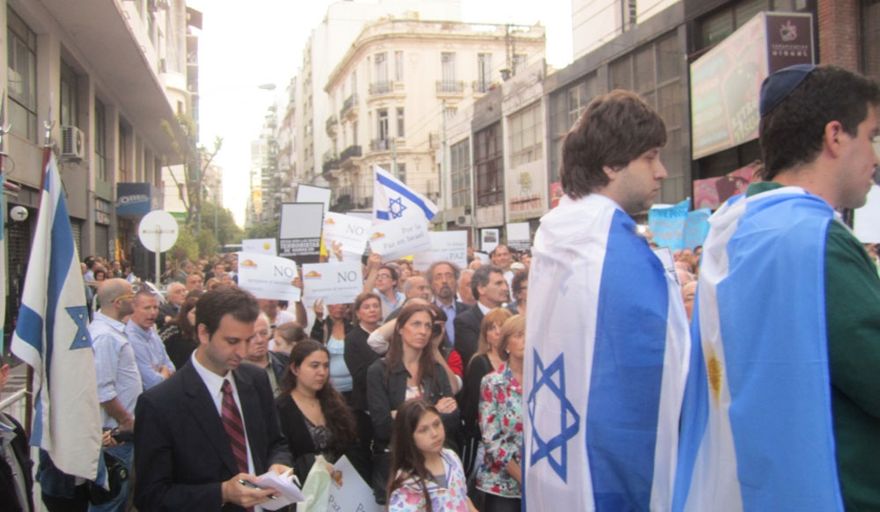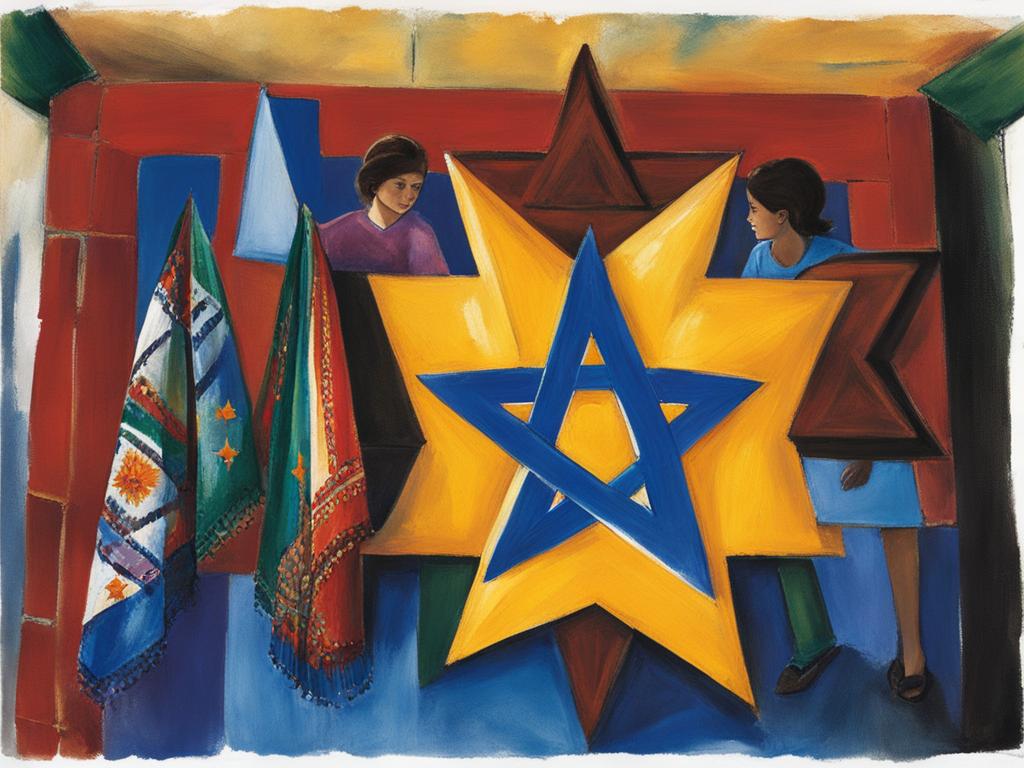Argentina is home to one of the largest Jewish communities in the world and the largest in Latin America, with a population of about 200,000. The Jewish diaspora in Argentina has a rich history, dating back to the mid-19th century when Jewish immigrants from Europe sought refuge during World War II. This community has contributed significantly to Argentine society and culture, making their mark in various fields such as arts, music, journalism, and business.
Argentina’s Jewish community has faced challenges throughout its existence, including periods of anti-Semitism and terrorist attacks. However, the government and numerous organizations are actively involved in supporting Holocaust survivors, preserving Jewish cultural heritage, and promoting archival access to ensure that the history and contributions of the community are remembered and celebrated.
Stay tuned as we delve into the historical background, current state, contributions, and challenges faced by the Jewish community in Argentina.
Historical Background of the Jewish Community in Argentina
The Jewish presence in Argentina dates back to the 15th century when Converso Jews settled in the country after being expelled from Spain. However, it was not until Argentina gained independence in 1816 that the organized Jewish community began to develop. In the mid-19th century, Jewish immigration from Europe increased, and a significant wave of Eastern European Jewish immigrants arrived in the late 19th and early 20th centuries.


Although Jews became active in various sectors of Argentine society, they also faced anti-Semitism and xenophobia. The rise of Juan Peron to power in 1946 caused concern among the Jewish population due to his fascist leanings, but he did establish diplomatic relations with Israel. The Jewish community also faced terrorist attacks in the 1990s, but despite these challenges, Jews continue to be active and influential in Argentine society.
Traveling to Argentina or Spain?
Study Spanish in Buenos Aires
Learn Spanish in Malaga
Learn Spanish with a Teacher
To understand the historical background of the Jewish community in Argentina, it is crucial to explore the waves of Jewish immigration, the discrimination they faced, and their contributions to Argentine society. By examining this history, we gain insights into the experiences and resilience of the Argentine Jewish community.
The Jewish Community in Argentina Today
The Jewish community in Argentina is vibrant and active, with numerous organizations and institutions supporting Jewish life. With an estimated population of around 200,000, it is the largest Jewish community in Latin America and the seventh largest in the world. Synagogues can be found throughout the country, but they are most concentrated in Buenos Aires, where the community is centered.
Leading Jewish organizations such as the Delegación de Asociaciones Israelitas Argentinas (DAIA) and the Congregacion Israelita de la Republica Argentina (CIRA) play a vital role in promoting Jewish culture, education, and social welfare. These organizations work tirelessly to ensure that the Jewish population in Argentina has access to religious services, educational programs, and community support.
The Jewish community in Argentina is diverse and encompasses a wide range of cultural and religious practices. From Orthodox to Reform Judaism, individuals have the freedom to express their religious beliefs and traditions. Argentine Jews also actively participate in cultural events, festivals, and activities that celebrate their heritage and promote interfaith dialogue.
Jewish Organizations in Argentina
- Delegación de Asociaciones Israelitas Argentinas (DAIA)
- Congregacion Israelita de la Republica Argentina (CIRA)
- Asociación Mutual Israelita Argentina (AMIA)
- Centro Hebreo Ioná
- Hebraica Macabi
These organizations, along with many others, work together to ensure the preservation of Jewish culture and identity in Argentina. They provide a wide range of services, including social welfare programs, educational initiatives, and community outreach. Through their efforts, the Jewish community continues to thrive and contribute to the multicultural fabric of Argentina.
| City | Number of Synagogues |
|---|---|
| Buenos Aires | 80+ |
| Córdoba | 10+ |
| Rosario | 5+ |
| Mendoza | 3+ |
| Mar del Plata | 2+ |
The table provides an overview of the number of synagogues in various cities across Argentina. It demonstrates the widespread presence of Jewish religious institutions throughout the country, reflecting the community’s deep-rooted connection to Argentina.
Moving to Argentina? We can help you get an Argentine Study Visa
Jewish Heritage in Argentina: Supporting Holocaust Survivors and Restitution Programs
Argentina is home to a significant Jewish community with a rich cultural heritage. In recent years, the country has made efforts to support Holocaust survivors through social welfare and restitution programs. Approximately 200 Holocaust survivors reside in Argentina, and organizations like Fundación Tzedaká work tirelessly to provide them with financial assistance, medical support, and social events. These organizations also help survivors access specific restitution programs from European governments, ensuring they receive the recognition and support they deserve.
Table: Holocaust Restitution Programs in Argentina
| Program Name | Description |
|---|---|
| Financial Restitution | Assistance in accessing financial compensation from European governments for Holocaust survivors. |
| Medical Assistance | Supporting survivors with medical treatments and healthcare services. |
| Food Security | Ensuring survivors have access to nutritious food and meal assistance. |
| Social Events | Organizing gatherings and activities to foster a sense of community and companionship among survivors. |
These restitution programs receive funding from various sources, including the Conference on Jewish Material Claims Against Germany. However, as the remaining survivors age, it is estimated that most social welfare and monetary restitution claims will cease in the next 10 to 15 years. Nevertheless, Argentina’s commitment to supporting Holocaust survivors remains unwavering.
Alongside supporting survivors, Argentina is actively engaged in promoting archival access and remembrance of the Holocaust. The government has opened archives related to Nazi arrivals in Argentina and has initiated the digitalization of these archives, enabling convenient access for researchers and interested individuals. By sharing these archives with Jewish organizations and researchers, Argentina aims to facilitate further study and preserve the historical memory of the Holocaust.
Overall, Argentina’s dedication to supporting Holocaust survivors and preserving Jewish cultural heritage highlights the country’s commitment to justice and remembrance. Through restitution programs, archival access, and commemorative events, Argentina ensures that the impact of the Holocaust is acknowledged, remembered, and learned from.


Jewish Cultural Heritage in Argentina: Archival Access and Remembrance
Argentina is deeply committed to preserving Jewish cultural heritage and ensuring access to archival materials related to the Jewish community and the Holocaust. The Argentine government, along with non-governmental organizations (NGOs), actively promotes the remembrance of the Holocaust and facilitates research and study through archival access.
Archival Access
The government of Argentina has taken significant steps to open archives related to the Jewish community, Nazi arrivals in Argentina, and laws restricting Jewish immigration during World War II. These archives provide valuable historical information and facilitate research on topics such as the Jewish diaspora, immigration patterns, and the impact of Nazi influence in the country.
Moreover, the government is undertaking the digitalization of these archives to ensure convenient access for researchers and scholars. By preserving and digitizing these records, Argentina aims to facilitate in-depth study and analysis of the Jewish history and cultural heritage in the country.
Remembrance
Argentina actively participates in international initiatives to commemorate the Holocaust and promote remembrance. As a member of the International Holocaust Remembrance Alliance (IHRA), the country hosts an annual Shoah memorial event on International Holocaust Remembrance Day, involving various government ministries.
Jewish organizations in Argentina also play a vital role in remembrance activities, organizing ceremonies, and events to honor the victims and preserve Jewish cultural heritage. These initiatives foster a collective memory of the Holocaust and promote understanding and tolerance among different communities.
| Archival Access and Remembrance in Argentina |
|---|
| Argentina actively opens archives related to the Jewish community and the Holocaust, facilitating research and study. |
| The government is digitizing these archives to ensure convenient access for researchers and scholars. |
| Argentina participates in international initiatives to commemorate the Holocaust, such as the IHRA. |
| Jewish organizations in Argentina organize ceremonies and events to honor the victims and preserve Jewish cultural heritage. |
The commitment of Argentina to archival access and remembrance reflects the country’s dedication to preserving Jewish cultural heritage and educating future generations about the atrocities of the Holocaust. By facilitating research and promoting remembrance, Argentina ensures that the lessons of history are not forgotten and that the Jewish community’s contributions to the country’s cultural fabric are honored.
Immovable and Movable Property Claims
The issue of immovable and movable property claims related to the Holocaust is complex in Argentina. When it comes to immovable property, there are no known claims or treaties addressing restitution for properties confiscated during the Holocaust. This means that Argentina does not have specific agreements or mechanisms in place to address these claims.
Regarding movable property, there are doubts about the presence of Holocaust-related items in Argentina. While some Nazi memorabilia has been confiscated, no specific claims for restitution of movable property have been processed. It is worth noting that Argentine museums do not conduct provenance research on their collections, which makes it challenging to trace the origins of items and determine if they are related to the Holocaust era.
To provide a comprehensive understanding of the situation, let’s summarize the main points in the table below:
| Immovable Property Claims | Movable Property Claims |
|---|---|
| No known claims or treaties | No specific claims processed |
| No agreements for restitution | No provenance research conducted on museum collections |
As we can see, the current situation in Argentina regarding immovable and movable property claims related to the Holocaust is one of limited action and resources. If you have any further questions or require more information, feel free to reach out to relevant authorities or organizations specializing in Holocaust restitution.
Additional Resources
- Delegación de Asociaciones Israelitas Argentinas (DAIA) – The official representative body of the Argentine Jewish community, which may provide further insights into the topic.
- Congregacion Israelita de la Republica Argentina (CIRA) – An organization that plays an essential role in promoting Jewish culture and education in Argentina.
Jewish Cultural Property and Archives
The Jewish community in Argentina has a rich and diverse cultural heritage that is preserved through various cultural properties and archives. Jewish Cultural Reconstruction provided Argentina with valuable artifacts, including books, museum pieces, and synagogue pieces, after World War II. These holdings, along with other Judaica that may have arrived in Argentina during or after the war, have not undergone provenance research to determine their origins or their significance in Jewish history.


The Argentine government has taken steps to open archives related to Jewish immigration, Nazi war criminals, and laws restricting Jewish immigration during that time. These archives have been made accessible to Jewish organizations and researchers, allowing for further study and exploration of Argentina’s Jewish history. Additionally, efforts have been made to digitize these archives, making them more easily accessible to scholars and individuals interested in Jewish history in Argentina.
While the lack of provenance research may limit our understanding of specific artifacts and their historical significance, the presence of these cultural properties and archives serves as a testament to the vibrant Jewish culture and history in Argentina. They provide valuable resources for researchers and individuals interested in exploring the Jewish influence and contributions in Argentine society.
Jewish Cultural Property and Archives
| Artifact Type | Origin | Current Location |
|---|---|---|
| Books | Jewish Cultural Reconstruction | Argentina |
| Museum Pieces | Jewish Cultural Reconstruction | Argentina |
| Synagogue Pieces | Jewish Cultural Reconstruction | Argentina |
It is important to continue researching and preserving Argentina’s Jewish cultural heritage. Provenance research can shed light on the historical significance of these artifacts and their connection to Jewish communities around the world. By investing in the study and preservation of Jewish cultural property and archives, Argentina can further celebrate and honor its rich Jewish history.


Jewish Contributions and Prominent Figures in Argentina
Jews have played a significant role in shaping the cultural, artistic, and economic landscape of Argentina. From literature to music, journalism to business, prominent Argentine Jews have left their mark on society. These individuals have not only contributed to the country’s development but have also helped foster a diverse and inclusive society.
One notable figure is Jacobo Timmerman, an influential writer and journalist who campaigned tirelessly for human rights during Argentina’s military dictatorship. His work shed light on the atrocities committed and helped bring justice to those affected. Another renowned Argentine Jew is Daniel Barenboim, an internationally acclaimed pianist and conductor who has achieved global recognition for his musical talent and dedication.
Moreover, Jewish businesses have made significant contributions to Argentina’s economy. From the fur and textile industries to chemicals, electronics, and automobiles, Jewish entrepreneurs have played a vital role in driving growth and innovation. Their entrepreneurial spirit has shaped various sectors and created job opportunities for many.
It is important to acknowledge that while Jews have made substantial contributions to Argentine society, there are still areas where they are underrepresented. Sectors such as the military, foreign ministry, and judiciary have lower Jewish representation compared to other fields. Recognizing this disparity and working towards equal representation is essential for fostering a more inclusive society.
Overall, Jewish contributions and prominent figures in Argentina have left an indelible mark on the country’s cultural, artistic, and economic fabric. Their achievements continue to inspire and shape Argentina’s diverse society, highlighting the valuable role of the Jewish community in the nation’s history and future.
Conclusion
The Jewish community in Argentina has a rich history and continues to thrive despite facing various challenges. From the early waves of immigration to the present day, Jews have played a significant role in shaping Argentine society and culture. They have contributed to fields such as arts, film, music, journalism, and business, making important contributions to the country’s economy and cultural fabric.
Although the community has faced periods of anti-Semitism and terrorist attacks, there have been significant efforts to support Holocaust survivors and promote remembrance. Argentina is home to approximately 200 Holocaust survivors, and organizations like Fundación Tzedaká have worked tirelessly to assist them through welfare programs and restitution initiatives. The government and NGOs have also been actively involved in preserving Jewish cultural heritage, providing archival access, and promoting Holocaust remembrance.
The future of the Argentine Jewish community depends on factors such as economic stability, social cohesion, and continued efforts to remember and celebrate Jewish culture and heritage. While challenges may persist, the community’s resilience and determination have ensured its survival and growth. The Jewish community in Argentina remains an integral part of the country’s social fabric, contributing to its diversity and enriching its cultural landscape.
FAQ
What is the size of the Jewish community in Argentina?
The Jewish community in Argentina has a population of about 200,000, making it the largest in Latin America and the seventh largest in the world.
When did the Jewish community in Argentina start to develop?
The organized Jewish community in Argentina began to develop after Argentina gained independence in 1816.
Are there any organizations supporting Jewish life in Argentina?
Yes, organizations such as the Delegación de Asociaciones Israelitas Argentinas (DAIA) and the Congregacion Israelita de la Republica Argentina (CIRA) play a vital role in promoting Jewish culture, education, and social welfare.
How many Holocaust survivors are there in Argentina?
Argentina is home to approximately 200 Holocaust survivors.
Are there programs to support Holocaust survivors in Argentina?
Yes, organizations like Fundación Tzedaká work to assist survivors in accessing specific restitution programs from European governments and provide additional support through medical assistance, food security, and social events.
What is Argentina doing to promote archival access and remembrance of the Holocaust?
Argentina is a member of the International Holocaust Remembrance Alliance (IHRA) and hosts a yearly Shoah memorial event on International Holocaust Remembrance Day. The government has opened archives related to Nazi arrivals in Argentina and has initiated the digitalization of these archives for convenient access. Jewish organizations also participate in ceremonies and events to remember the Holocaust and preserve Jewish cultural heritage.
Are there any immovable property claims related to the Holocaust in Argentina?
There are no known Holocaust-related immovable property claims in Argentina.
Has provenance research been conducted on Jewish cultural property in Argentina?
No, provenance research has not been conducted on Jewish cultural property that may have arrived in Argentina during or after the war.
Who are some prominent Argentine Jews?
Prominent Argentine Jews include writer Jacobo Timmerman, who campaigned for human rights, and pianist Daniel Barenboim.
What contributions have Jews made to Argentine society?
Jews have made significant contributions to Argentine society in various fields, including the arts, film, music, journalism, and business.




